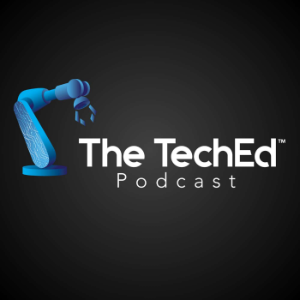
The TechEd Podcast
Education Podcasts
Bridging the gap between technical education & the workforce 🎙 Hosted by Matt Kirchner, each episode features conversations with leaders who are shaping, innovating and disrupting the future of the skilled workforce and how we inspire and train individuals toward those jobs.
STEM, Career and Technical Education, and Engineering educators - this podcast is for you!
Manufacturing and industrial employers - this podcast is for you, too!
Location:
United States
Genres:
Education Podcasts
Description:
Bridging the gap between technical education & the workforce 🎙 Hosted by Matt Kirchner, each episode features conversations with leaders who are shaping, innovating and disrupting the future of the skilled workforce and how we inspire and train individuals toward those jobs. STEM, Career and Technical Education, and Engineering educators - this podcast is for you! Manufacturing and industrial employers - this podcast is for you, too!
Twitter:
@teched_podcast
Language:
English
Website:
https://techedpodcast.com/
Email:
info@techedpodcast.com
Cultural Mapping: How to Build Trust and Influence In Your Organization - Dr. Ben Johnson and Bobby Dodd
Duration:00:48:23
Reframing Higher Education: A Connected Model for Colleges and Universities - Dr. Katherine Frank & Dr. Sunem Beaton-Garcia
Duration:00:54:08
Training the Technicians at the Heart of Amazon’s Highly-Automated Facilities - Amanda Willard & Logan Schulz, Amazon RME
Duration:00:48:09
The Rise of State-Backed VC: Michigan’s Bet on Emerging Entrepreneurs - Pete Martin, MSU Research Foundation and Alison Todak, MEDC
Duration:00:47:35
13 Predictions for Technical Education in 2026
Duration:01:13:53
Ask Us Anything: Workforce ROI, AI Hallucinations, and the 5 Pillars of World-Class CTE
Duration:00:46:40
At the Reagan Ranch: The Life & Legacy of One of America's Greatest Presidents - Scott Walker, President of Young America's Foundation
Duration:01:00:12
Using Values and Customer Experience to Guide an AI and Data-Driven Strategy - Irv and Ryan Blumkin, Chairman and EVP of Nebraska Furniture Mart
Duration:00:54:26
Six Days in China: The Speed, Scale, and Strategy Outpacing U.S. Innovation - Todd Wanek, CEO of Ashley Furniture
Duration:01:01:52
Applied AI on the Edge Proves There’s More to AI Than ChatGPT - Brian Cavanaugh, CEO of VigilanteX
Duration:00:46:28
What's Your Region's Economic DNA? Lessons for CTE from an Aviation High School - Adam Snoddy, Principal of Butler Tech Aviation Center
Duration:00:55:23
Technical Colleges: Breaking Generational Poverty and Building Economic Mobility - Dr. Anthony Cruz, President of MATC
Duration:00:53:38
Moving from “Just-in-Case” Education to a Demand-Driven, Industry-Led Model — Paul Lavoie, VP of the University of New Haven
Duration:00:54:38
How to Get Started with AI in Your Business (Practical Tips & Real Technologies) - Part 2
Duration:00:47:22
How to Get Started with AI in Your Business (Practical Tips & Real Technologies) - Part 1
Duration:00:52:52
The $1 Trillion Workforce Opportunity for Rural Education - Duwain Pinder, Partner at McKinsey & Company
Duration:00:49:34
A Vision Built on Alignment: Wanek Center of Innovation Reinvents the Path to Industry 4.0 Careers
Duration:01:03:00
When the Right Engineering Can Save Lives: Why Fashion Needs More Scientists – Michael Drescher, Vibrant Body Company
Duration:00:46:04
Ask Us Anything: Early Career Choices, the War for Talent and the Rise of AI
Duration:00:46:44
How Technical Colleges Are Redefining Learning for the Future of Work - Layla Merrifield, President of the WTCS
Duration:00:55:52